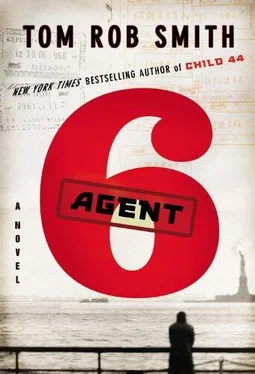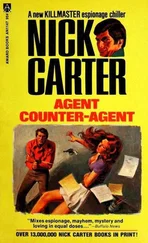Tom Smith - Agent 6
Здесь есть возможность читать онлайн «Tom Smith - Agent 6» весь текст электронной книги совершенно бесплатно (целиком полную версию без сокращений). В некоторых случаях можно слушать аудио, скачать через торрент в формате fb2 и присутствует краткое содержание. Жанр: Триллер, на английском языке. Описание произведения, (предисловие) а так же отзывы посетителей доступны на портале библиотеки ЛибКат.
- Название:Agent 6
- Автор:
- Жанр:
- Год:неизвестен
- ISBN:нет данных
- Рейтинг книги:4 / 5. Голосов: 1
-
Избранное:Добавить в избранное
- Отзывы:
-
Ваша оценка:
- 80
- 1
- 2
- 3
- 4
- 5
Agent 6: краткое содержание, описание и аннотация
Предлагаем к чтению аннотацию, описание, краткое содержание или предисловие (зависит от того, что написал сам автор книги «Agent 6»). Если вы не нашли необходимую информацию о книге — напишите в комментариях, мы постараемся отыскать её.
Agent 6 — читать онлайн бесплатно полную книгу (весь текст) целиком
Ниже представлен текст книги, разбитый по страницам. Система сохранения места последней прочитанной страницы, позволяет с удобством читать онлайн бесплатно книгу «Agent 6», без необходимости каждый раз заново искать на чём Вы остановились. Поставьте закладку, и сможете в любой момент перейти на страницу, на которой закончили чтение.
Интервал:
Закладка:
She checked her watch. With still no sign of Comrade Demidov, she flicked through the pages in her exercise book, reading over the collection of quotes: Ideas are more powerful than guns. We would not let our enemies have guns, why should we let them have ideas?
The insurgency was largely illiterate, most fighters could not read or write. Yet they were possessed with a powerful idea – that this was an unjust invasion, that Communism was a foreign abomination and that they would ultimately prevail no matter how many well-equipped soldiers were sent here to die. God was on their side. History was on their side. Destiny was on their side. These ideas were far more dangerous than their outdated weapons. The challenge was how to disavow someone of the belief that victory was inevitable.
Hearing the door open, she looked up. Her teacher had arrived. With silver hair, greying stubble and skin that was much darker than many of his fellow Soviets, he was unique among the foreigners both in appearance and personality. She’d never seen him wear a uniform. She’d never seen him make much of an effort over his appearance. He seemed perpetually distractd, as though in a permanent daydream, with reality only infrequently demanding his attention. He was handsome, she supposed, although she quickly dismissed the observation as irrelevant. Belatedly he noticed that Nara was the only student in the class. He asked, his voice raspy and dry:
– Where is everyone?
She said:
– The others have gone home.
He looked around at the empty desks neither annoyed nor amused, his expression blank. She added by way of explanation, nervous that it would sound like a criticism:
– The class was supposed to start at midday.
Comrade Demidov checked the clock on the wall. He was three hours late. Turning back to Nara, he asked:
– You’ve been here for three hours?
– Yes.
– How long were you planning to wait?
– I’m happy to catch up with my work. It’s quieter here than at home.
He walked towards her, picking up her exercise book, reading through her list of quotes. She explained:
– I wanted to make sure I understood our party’s wisdoms.
Every time she referred to the party, Comrade Demidov would look at her carefully, no doubt evaluating her loyalty. He said, reading from her page:
– Trust but Check.
She explained, trying to impress him:
– No matter how much you trust a person, they should always be kept under watch. The point is that as an agent we do not have the luxury of presuming people to be innocent.
– Do you know who said this?
Nara nodded, and declared proudly:
– Comrade Stalin.
Leo regarded his student speaking Stalin’s name as though he were a wise and adored village elder, friend to all and tyrant to none. Nara’s facial features were remarkably soft. There was hardly a harsh line in her face, round cheekbones, a small round nose and most notably large pale-green eyes. The weakness of the colour made them more striking, rather than less, as though only a few drops of colour had been mixed with water. They gave an impression of intense curiosity and, combined with her earnestness, it was as if she were trying to absorb and understand every detail of the world around her. Her face and demeanour reminded him of a young deer, an animal striving to appear magnificent, the keeper of the forests, but still young and scared. It was odd to associate her so strongly with a creature she’d never seen, and perhaps never even heard of. From appearances alone he would wager that she did not have the personality of an agent. There was a softness and openness that made it difficult to imagine her taking what were commonly referred to as necessary measures. Could she arrest her fellow countrymen? However, he accepted that appearances could be deceptive and he’d been wrong about people far too many times to put faith in such a superficial observation.
As for her understanding of Stalin’s words, they were abstract notions that she’d memorized in order to fulfil her ambitions. She’d never implemented those words, or seen an entire society changed by them, a population unable to trust anyone, even family, friends and lovers. To her Trust and Check was a Communist aphorism, something to repeat and to be praised for repeating. She was not merely ambitious but idealistic, a Utopian who genuinely believed in a vision of a perfect society, serious about the promise of progress, without a hint of cynicism, or a doubt in her mind. In this regard, she reminded Leo very much of Elena. Perhaps that was why he tolerated her fanatical loyalty to Communism, understanding it within the context of a character that could not live without a dream of some description. Perhaps also he warmed to her because underneath her certainty there was a touch of melancholy, as if her optimism had been painted over a troubled soul. He did not believe she’d stayed in the classroom merely because she wanted to work. She was hiding from something at home. Related to that, her assertiveness did not come naturally: it was practised. Sometimes she caught herself and retreated from a comment or observation, worried she’d gone too far. And just as Raisa had found beauty to be a dangerous asset, so did this young woman who made a conscious effort to be plain, wearing a uniform that was too large for her, the poor cut hiding her figure. Her hair was always tied back. There was never any suggestion of makeup, never a hint of perfume. Leo had seen her blush at attention, hating to be stared at, perhaps hating her own beauty because of it. Her beauty and her sadness had always struck him at the same time, as if it was impossible to observe one without the other.
Since there were no other students in the class, Leo was about to send her home when Captain Vashchenko entered. It amused Leo that the captain appeared to consider knocking a weakness and barging into a room an act of strength, a triumph over etiquette. They’d spoken on several occasions since the Christmas invasion and Leo found him to be straightforward to deal with. Ruthlessness was often far simpler to understand than moderation. If presented with a choice, the captain always took the most aggressive approach. He didn’t stand on ceremony. He wasn’t interested in privilege, nor seduced by the comforts available to a military officer. Not particularly tall, he was physically robust, well built; everything about him seemed dense and compact, his body, shoulders, chest and his jaw. To his own surprise, Leo found it hard to dislike him – it would be like disliking a shark, or another lethal predator. There was no outward or obvious psychological darkness, no sadism or perverse relish in violence – he was interested only in expediency. In short, he would do whatever it took and he would never back down.
The captain impatiently addressed Leo, speaking in Russian:
– A high-ranking officer from the 40th Army disappeared last night. There was no security breach in the headquarters. No sign of a disturbance. We believe it to be a desertion. A car is missing from the grounds. My men are looking for him. We have checkpoints on all the roads. We have found no sign of him. We need your help. No one knows Kabul as well as you.
– No one except the Afghans.
The captain had no time for Leo’s flippancy, pressing his demands:
– If he’s in the city, you’ll find him, I’m sure of that.
– How important is this man?
– He’s important. More important, we must show desertion cannot be tolerated.
It was the first desertion that Leo had heard of. He was sure many more would follow. Summers were long and hot, sickness was common, and they were far from home.
The captain seemed to notice Nara Mir for the first time.
– Is she one of your students?
Читать дальшеИнтервал:
Закладка:
Похожие книги на «Agent 6»
Представляем Вашему вниманию похожие книги на «Agent 6» списком для выбора. Мы отобрали схожую по названию и смыслу литературу в надежде предоставить читателям больше вариантов отыскать новые, интересные, ещё непрочитанные произведения.
Обсуждение, отзывы о книге «Agent 6» и просто собственные мнения читателей. Оставьте ваши комментарии, напишите, что Вы думаете о произведении, его смысле или главных героях. Укажите что конкретно понравилось, а что нет, и почему Вы так считаете.












